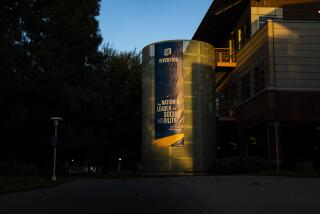Teacher Quits Whittier College After Tenure Is Denied
- Share via
WHITTIER — A popular biology teacher at Whittier College, this year’s recipient of the annual student body award for exceptional “service and devotion,” is resigning after being denied tenure.
Katherine Sapiro submitted her resignation, effective at the end of the month, after the college’s president, James L. Ash Jr., upheld a faculty personnel committee decision to deny tenure. The college would have allowed her to remain another year as an assistant professor without tenure.
The committee’s decision in April triggered a student protest. A total of 116 students--about 12% of the college’s enrollment--signed a letter saying Sapiro’s case should be reconsidered.
Sapiro, who taught at Whittier for five years, said she has accepted a part-time teaching job at Cal State Long Beach and a part-time research position at Children’s Hospital in Los Angeles.
During the April protest, students said the 35-year-old biologist was a model of the ideal Whittier professor. They described her as an outstanding and stimulating teacher.
As proof of her dedication, the students pointed out that she had organized an advanced class not in the college catalogue so that Whittier premedical students would have a leg up on their medical school curriculum.
Ash notified Sapiro last week in a brief letter that he would not reverse the committee’s decision. Her departmental peers had recommended to the committee that she be denied tenure on the grounds her research was inadequate.
In a letter to Ash two weeks ago saying she would resign to accept the new teaching and research jobs unless he overruled the committee, Sapiro said the complaints about her research were unwarranted and suggested they may have been a pretense for sexism on the part of some biology department faculty.
Ash, who assumed the presidency last month after Eugene S. Mills retired, declined to comment, saying it was his policy not to discuss personnel matters.
Research Defended
In her letter to Ash, Sapiro, whose field is molecular and cellular biology, argued that her research was more than adequate.
In 1986, she said, her peers first recommended that she not get tenure because her research work was lacking. But an outside expert, hired by the college, concluded her research was “feasible, appropriate, timely and interesting, in direct contrast to the department’s evaluation,” Sapiro said in her letter to Ash.
Sapiro also pointed out that in 1986, the personnel committee reprimanded the department for using sexist language in criticizing Sapiro’s work. The department, in a letter to the personnel committee, called Sapiro aggressive and said that she bullied other faculty members and denigrated their opinions. Sapiro denied the assertions.
“The vituperative nature of the biology department’s letters,” Sapiro said in her letter, “reflect what I believe is the real issue here. It is not my professional performance in the classroom, advisement, participation in campus life or even in the laboratory.”
‘Personal Animosity’
She went on to say that the biology department’s rejection of her tenure “is grounded in the personal animosity of some of its members and the unwillingness of others to stand apart or to stand up for what is right.”
If bias exists, Sapiro said, the personnel committee, in accepting the department’s recommendation, has adopted the same bias.
Sapiro said last week that she believes the move from Whittier is better for her scientific career. She said she always believed that she would be happy to remain part of the Whittier campus community but, “when push came to shove,” she said, “the community did not stand up for what I thought it should have.”
More to Read
Sign up for Essential California
The most important California stories and recommendations in your inbox every morning.
You may occasionally receive promotional content from the Los Angeles Times.













